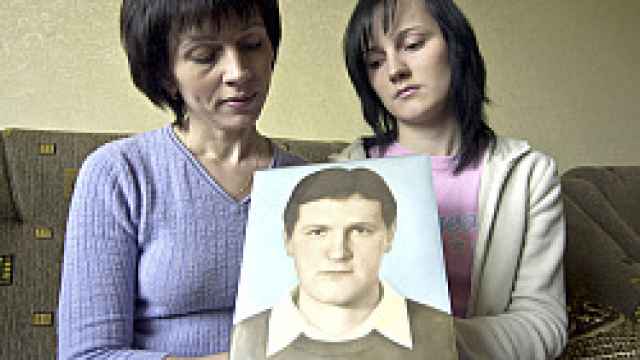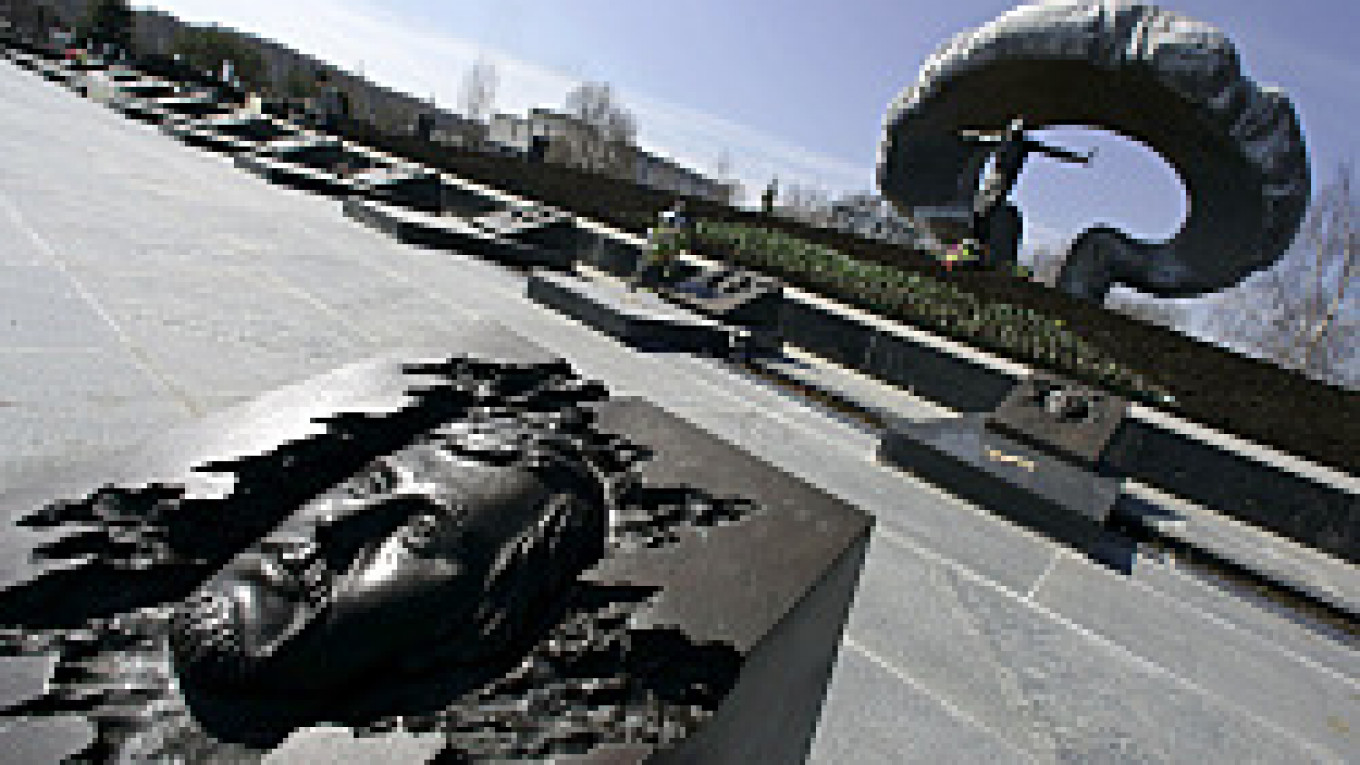At first, Shashenok thought that it was nothing serious -- her husband, Volodymyr, had told her many times that his engineering job wasn't dangerous. "In the case of an accident, we have a special button," he used to say. But when Shashenok saw Volodymyr at the hospital she was terrified.
"It was not my husband at all, it was a swollen blister," she said in an interview. He was connected to a breathing apparatus, but Lyudmila, a nurse, knew the situation was hopeless.
"I told him, 'This is the end, Volodya,'" she recalled.
As Ukrainians slept on April 26, 1986 -- 20 years ago Wednesday -- a reactor at the nuclear power station exploded in the world's worst nuclear accident. Within two months, 29 station workers and firefighters had died.
Soviet officials praised the firefighters for their heroism, but blamed station workers for the accident. Shashenok and the other workers' wives had to cope not only with the deaths of their husbands, but also with the public disgrace; even their benefits are less than those received by the firefighters' wives.
The women say their second-class status has made them rely on each other for moral support. Once a year on the anniversary of the accident, they travel as a group -- filling a whole train carriage -- to a cemetery in Moscow where their husbands are buried in lead-encased coffins.
"I always look forward to these trips," said Nataliya Lopatyuk, 41, whose husband, Viktor, an electrician at the station, died from radiation poisoning 22 days after the explosion. "It is an opportunity to share our memories. All of us came through this grief."
Volodymyr Shashenok died just five hours after the accident. Shashenok, who was working under the reactor, suffered severe burns from the irradiated steam and water. When Shashenok was being rushed to the hospital in the ambulance car, his co-workers told his wife that he kept repeating, "I turned off the voltage. ... I did everything."
Shashenok wasn't even supposed to work that night. He'd begun repairs to his family's apartment the day before the accident -- a Friday -- and planned to spend the weekend completing the job. But he got called in on Saturday.
Shashenok was buried two days after the accident in a village cemetery near Chernobyl. Lyudmila Shashenok wasn't there. She had been evacuated from her home, and officials didn't bother to find her and tell her about the time of the ceremony.
Over a year later, Shashenok was reburied at Mitinskoye Cemetery in Moscow where the first 29 victims of Chernobyl were all laid to rest in lead-shelled coffins. Concrete slabs were put over them.
Lopatyuk, 41, spent a week in Moscow at the bedside of her dying husband, Viktor. She was 21 years old and eight months pregnant when her husband left for his shift that Saturday and didn't return the next morning. She'd already heard rumors about the accident, and frantically began calling everywhere to find her husband. She was finally told that he had been hospitalized but that it was not dangerous -- and he was being sent to Moscow for further treatment. She had 15 minutes to say goodbye.
 Sergei Chuzavkov / AP Nataliya Lopatyuk and her daughter, Yulia, holding a portrait of Viktor in Kiev. | |
"I still blame myself for the hope that I gave then to myself and to his parents," she said, tears welling in her eyes.
The hope was short-lived. Within two days, Viktor had gone completely bald, with terrible burns bubbling up on his arms. "I could see his bones," she said. On May 16, he died.
Their daughter, Yulia, was born 18 days later. "He'd dreamed so much of having a daughter named Yulia," Natalya Lopatyuk said.
Yulia, 19, is often asked why her father and his co-workers didn't run from the station immediately. His co-workers, though, praise him and others for turning off a hydrogen generator several minutes after the explosion.
Her mother has taught Yulia to be proud, and said her daughter always answers: "If not them ... me, you and millions of other people would not exist."
The wives said they were still struggling to come to terms with the loss. Lyudmila Shashenok recalled that on the apartment building where she lived in Pripyat she would often glance at the luminous inscription: "Let the atom be a worker, not a soldier."
"I never thought the atom would kill my husband," she said.
A Message from The Moscow Times:
Dear readers,
We are facing unprecedented challenges. Russia's Prosecutor General's Office has designated The Moscow Times as an "undesirable" organization, criminalizing our work and putting our staff at risk of prosecution. This follows our earlier unjust labeling as a "foreign agent."
These actions are direct attempts to silence independent journalism in Russia. The authorities claim our work "discredits the decisions of the Russian leadership." We see things differently: we strive to provide accurate, unbiased reporting on Russia.
We, the journalists of The Moscow Times, refuse to be silenced. But to continue our work, we need your help.
Your support, no matter how small, makes a world of difference. If you can, please support us monthly starting from just $2. It's quick to set up, and every contribution makes a significant impact.
By supporting The Moscow Times, you're defending open, independent journalism in the face of repression. Thank you for standing with us.
Remind me later.


